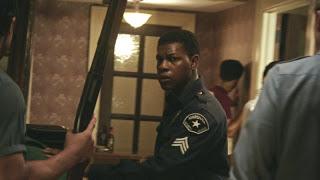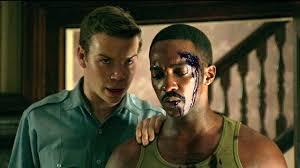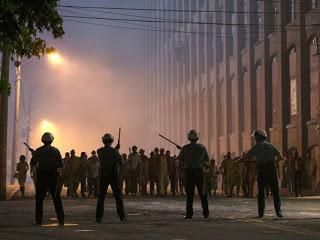 Few directors handle white-knuckle intensity better than Kathryn Bigelow, and Detroit (2017) delivers that in spades. The movie's second act, an hour of brutal physical and psychological torture, is so compelling that it overwhelms the occasionally logy material surrounding it.
Few directors handle white-knuckle intensity better than Kathryn Bigelow, and Detroit (2017) delivers that in spades. The movie's second act, an hour of brutal physical and psychological torture, is so compelling that it overwhelms the occasionally logy material surrounding it.In July 1967, Detroit breaks out into a savage race riot after a police raid on an after-hours bar. Mobs loot the city, police and soldiers try restoring order, and innocents are caught in the crossfire. The movie centers on a harrowing night at the Algiers Motel, where a gathering of mostly black men are set upon by trigger-happy cops led by the sadistic Phillip Krauss (Will Poulter). Three men are killed, and the survivors - security guard Melvin Dismukes (John Boyega), singer Larry Reed (Algee Smith) and Vietnam vet Greene (Anthony Mackie) among them - try to puzzle out where to go from here.
While the Detroit Riot has accrued due literary attention (forming a major part of Jeffrey Eugenides' Middlesex and Joyce Carol Oates' Them), it's only received fleeting cinematic treatment (a montage in Across the Universe). Bigelow and writer Mark Boal spend about forty-five minutes setting the stage, with an animated opening on the Great Migration, news footage and inter-titles explaining the city's racial tension. Elaborate recreations of rioting and police response are jaw-droppingly ambitious, especially since they're largely background material for the main story. It's long-winded but pays off immensely, immersing us in a world of open racial warfare before its central set piece.
 Detroit certainly isn't a subtle movie, yet its connections with modern protest movements are left between the lines. Officer Krauss shoots an unarmed looter early on, yet amid the chaos of rioting his crime's forgotten. Larry initially escapes suspicion due to his swanky duds, while Melvin works two jobs and tries smoothing over interracial tensions. The central troublemaker is Carl (Jason Mitchell), a loudmouth who uses a cap gun to illustrate how little black lives matter to authorities, and whites generally. We could put Krauss's actions down to metaphorical bad apples, except that state troopers and soldiers either cooperate or wash their hands, while city authorities look for scapegoats rather than justice. Turning the other cheek makes them equally complicit.
Detroit certainly isn't a subtle movie, yet its connections with modern protest movements are left between the lines. Officer Krauss shoots an unarmed looter early on, yet amid the chaos of rioting his crime's forgotten. Larry initially escapes suspicion due to his swanky duds, while Melvin works two jobs and tries smoothing over interracial tensions. The central troublemaker is Carl (Jason Mitchell), a loudmouth who uses a cap gun to illustrate how little black lives matter to authorities, and whites generally. We could put Krauss's actions down to metaphorical bad apples, except that state troopers and soldiers either cooperate or wash their hands, while city authorities look for scapegoats rather than justice. Turning the other cheek makes them equally complicit.The movie hits its stride when the authorities converge on the Algiers Motel. With the same precision intensity that drove Zero Dark Thirty's climactic SEAL raid, Bigelow immerses us in a hellish experience of shotgun blasts, beatings and psychological torture. The police quickly lose their reason, barking threats and racial slurs against innocent men, then holding mock executions of the black men. The officers grow infuriated at finding Greene with two young white women (Hannah Murray and Kaitlyn Dever), as if confirming their worst fears. The situation starts in unambiguous savagery and grows exponentially worse as it unfolds.
It's a masterful hour of cinema, playing out not only through grim close-ups and savage violence but a million mini-dramas: Krauss's sickening realization that he's made a mistake (and stubborn commitment to seeing it through); a soldier (Austin Hebert) who struggles to do the right thing; Greene's insistence about his military service undercut by fears of miscegenation; Fred (Jacob Lattimore), Larry's friend who refuses to back down. The saddest dilemma is Melvin, who collaborates with the police in a sincere, but misguided effort at avoiding bloodshed. He's reduced to a passive spectator who, with sickening irony, is accused of murder along with the cops.
 Indeed, this scene's so ferociously compelling that when Detroit moves on, it loses momentum. Bigelow deals with the legal and personal fallout, with authorities first covering up, then reluctant trying to prosecute the killings, Melvin's dilemma, Larry turning his back on a record deal. These scenes aren't without interest but feel half-baked, with some character strands left hanging while dwelling upon others (Larry's especially) excessively. Then again, there probably wasn't any way to follow up such an amazing second act without seeming anticlimactic.
Indeed, this scene's so ferociously compelling that when Detroit moves on, it loses momentum. Bigelow deals with the legal and personal fallout, with authorities first covering up, then reluctant trying to prosecute the killings, Melvin's dilemma, Larry turning his back on a record deal. These scenes aren't without interest but feel half-baked, with some character strands left hanging while dwelling upon others (Larry's especially) excessively. Then again, there probably wasn't any way to follow up such an amazing second act without seeming anticlimactic.The cast makes the most of roles that are, by necessity, broadly sketched. John Boyega sells Melvin's turmoil, while Anthony Mackie's quiet authority makes him memorable despite minimal screen time. Algee Smith gets the movie's biggest character arc and executes it beautifully, even if Bigelow doesn't seem entirely sure how to handle it. Will Poulter's role is humanized enough not to seem like a cartoon; his growing frustration and violent stubbornness makes his descent into bestiality compelling. He goes from a cop doing a job to a monster with remarkable, sickening ease.
And this is Detroit's real message, still tragically relevant a half century after the Riot. Bigelow indicts a society that might mean well, may mouth progressive platitudes, but ultimately exploits, ghettoizes, lets down its minorities time and again. It's easy to hate the Krausses, but the Lyndon Johnsons, the George Romneys and even the Melvins also bear responsibility. In this, along with its breakneck filmmaking, it makes for impactful, disquieting viewing.

